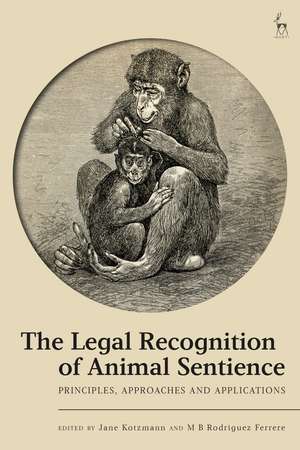The Legal Recognition of Animal Sentience: Principles, Approaches and Applications
Editat de Jane Kotzmann, M B Rodriguez Ferrereen Limba Engleză Hardback – 29 mai 2024
Preț: 513.52 lei
Preț vechi: 733.03 lei
-30% Nou
Puncte Express: 770
Preț estimativ în valută:
98.26€ • 107.07$ • 82.80£
98.26€ • 107.07$ • 82.80£
Carte tipărită la comandă
Livrare economică 23 aprilie-07 mai
Preluare comenzi: 021 569.72.76
Specificații
ISBN-13: 9781509970452
ISBN-10: 1509970452
Pagini: 448
Dimensiuni: 156 x 234 x 25 mm
Greutate: 0.68 kg
Editura: Bloomsbury Publishing
Colecția Hart Publishing
Locul publicării:London, United Kingdom
ISBN-10: 1509970452
Pagini: 448
Dimensiuni: 156 x 234 x 25 mm
Greutate: 0.68 kg
Editura: Bloomsbury Publishing
Colecția Hart Publishing
Locul publicării:London, United Kingdom
Caracteristici
Identifies limitations of animal sentience recognition and proposes some solutions to these issues
Notă biografică
Jane Kotzmann is Alfred Deakin Postdoctoral Research Fellow at the School of Law, Deakin University, Australia. M B Rodriguez Ferrere is Associate Professor at the Faculty of Law, University of Otago, New Zealand.
Cuprins
Foreword, Donald Broom (University of Cambridge, UK)Introduction, Jane Kotzmann (Deakin University, Australia) and M B Rodriguez Ferrere (University of Otago, New Zealand)Part One: First Principles of Sentience Recognition1. The Nature and Scope of the Legal Recognition of Animal Sentience: A Functional Comparative Analysis of the Lex Lata, and Critical Remarks on Its Future Development, Charlotte Blattner (University of Bern, Switzerland)2. Sentience, Empathy, and the Need for Both Justification and Motivation, Morgan Stonebridge (Deakin University, Australia)3. Drafting and Interpreting Sentience Provisions: Incorporating Modern Science in Animal Welfare Law as a Legislative Requirement, Daniel Goldsworthy (Deakin University, Australia) and Ian A Robertson (Sentient Animal Law Foundation, New Zealand)4. Sentience Recognition as a Means for Moving Beyond Animal Welfare to Animal Rights, Jane Kotzmann (Deakin University, Australia)Part Two: Regional and National Approaches to Legal Recognition5. Owning Sentient Beings: The Potential of Sentience Recognition in Continental Law, Eva Bernet Kempers (University of Antwerp, Belgium)6. Common Sense: Animal Sentience and the Common Law, Joe Wills (University of Leicester, UK)7. All Roads Lead to Sentience: The Past, Present, and Future of Animal Legal Protection in Brazil, Vanessa Gischkow Garbini (Harvard Law School, USA)8. The Judicial Recognition of Animal Sentience: Developments in Pakistan and India, Hira Jaleel (Lewis and Clark Law School, USA)9. Legal Recognition of Sentience in New Zealand, M B Rodriguez Ferrere (University of Otago, New Zealand)10. A Field Trip into Québec Law: Exploring the Theoretical Ramifications of Sentience Recognition, Michaël Lessard (University of Sherbrooke, Canada)11. Perspectives on the Recognition of Animal Sentience in Spain, Carlos Andrés Contreras López (Harvard Law School, USA)12. The Animal Sentience Committee: Evolution or Revolution in the Legal Recognition of Animal Sentience in the UK? Rachel Dunn (Leeds Beckett University, UK) and Joshua Jowitt (Newcastle University, UK) 13. Affirmative Acts of Recognition: How Codifications of Animal Sentience are Ushering Animals into the Focus of U.S. Law, Rajesh K Reddy (Lewis & Clark Law School, USA)Part Three: Applications and Limitations14. Sentiency, Exceptionalism and Farm Animal Protection, Steven White (Griffith University, Australia)15. Err on the Side of Sentience: The European Precautionary Principle, Article 13 of the Treaty on the Functioning of the European Union and Invertebrates, Paulien Christiaenssen (Ghent University, Belgium)16. Animal Sentience Recognition and Theoretical Connotations: Possible Implications for Animals in Research, Jane Kotzmann (Deakin University, Australia) and Hope Ferdowsian (University of New Mexico School of Medicine, USA)17. The Utility (or Otherwise) of Symbolic Legislation, M B Rodriguez Ferrere (University of Otago, New Zealand)
